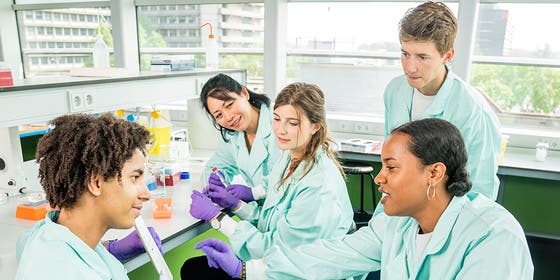Diversity and Inclusion Goes Much Further than Men and Women

As an organisation we want to be a reflection of the society in which we work. Today, on International Women's Day, this is something to think about. But why is diversity and inclusion from a male-female perspective actually important for our healthcare, our education and our research? We asked three female colleagues. And, of course, a male colleague too.
Diversity and inclusion are important to the UMC Utrecht. This is stated in our the organisational strategy for 2020-2025, Connecting Worlds. Part of this is the relationship between women and men. In our active diversity policy, we opt for a balanced division in care, research and education. Because the more (gender) diversity we have, the more brainpower we have. And only with brainpower from all these different perspectives can we innovate in healthcare, research and education.
Subtle Exclusion in the Workplace
However, it remains difficult for women to obtain the same positions, be treated equally and be taken as seriously as men. “There is actually no equality. Our thoughts and judgments are often guided by very subtle exclusion mechanisms. This is also called the implicit bias", says Annelien Bredenoord, Professor of Ethics of Biomedical Innovation. ”A study published in PNAS, for instance, showed that people judge the exact same work and the same CV differently when a woman's name is added versus when a man's name, or when a non-Dutch name is added. This happens even though we don't want it to. It happens everywhere, not just in UMC’s. Basically: we know this happens so we should do something about it.”
Equal Opportunity in Education
Bias also plays a role in education and not just from a gender perspective. “After finishing a presentation, a Dutch student with a migration background received the comment 'Your Dutch is so good!' from a teacher. That sounds quite innocent, and the teacher probably meant it as a compliment, but the student experienced it differently. This student probably receives comments like this regularly, continuously being labelled as 'different' ", says Gisela van der Velden, Assistant Professor Educational Innovation and member of the Platform Diversity & Inclusion. If we want to offer all students at the UMC Utrecht equal opportunities to successfully complete their education, regardless of their background characteristics, we will have to be inclusive and ensure that all students feel at home and feel they can truly be themselves. We need to prevent implicit bias from negatively affecting their changes.”
Role models in research
'Nothing in life is to be feared, it is only to be understood'. For Professor of Ophthalmology Joke de Boer, this quote from nineteenth-century researcher Marie Curie is about diversity in scientific research. According to Joke, good female role models can play a major role in this. “Marie Curie was one of the most successful female researchers in the late nineteenth and early twentieth century, far ahead of her time as a female researcher. For me, she has really been a role model as a researcher who combined her successful career with having a family. She was awarded the Nobel Prize in 1903, along with Henri Becquerel for their work on radioactivity, which was a breakthrough in medicine. She was married to Pierre Curie, also a researcher, who died after a tragic accident with a horse-drawn carriage in Paris. Despite this tremendous misfortune, she had the willpower to continue her research on radioactivity.”
Much Further than Male-Female
We are continuously increasing awareness about diversity and inclusion in our organisation, with measures such as the special Westerdijk chair and previously the Elisabeth Steyn Parvé programme. With female role models, but also with bias awareness trainings, which according to Annelien and Gisela, ensure that employees become explicitly aware of their implicit preferences. “At the UMC Utrecht, we have been working with targets for female talent for years. And we have taken good steps in the right direction," says Joost Sluijs, director P&O. "Diversity and inclusion naturally goes much further than a proper gender distribution. People’s origin, religion, sexual orientation, language, disabilities, skin color and education also play a role. In the coming years, we will focus even more on the broader meaning of diversity and inclusion. For example, in the new talent programme we will consciously be recruiting a diverse group of talented people."
